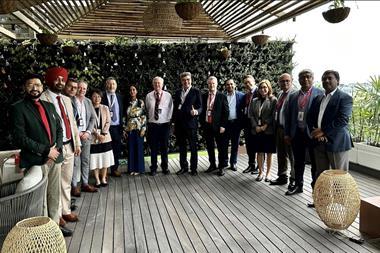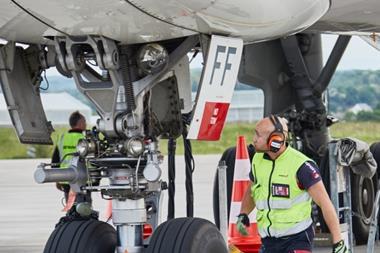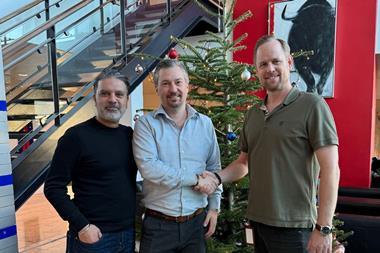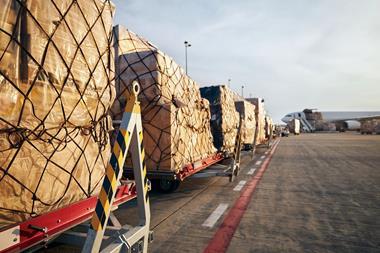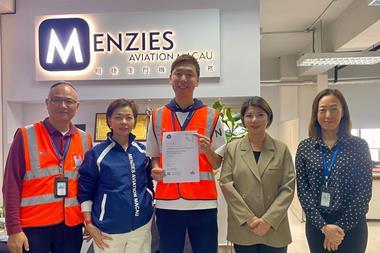Industry stalwart John Batten will bring to bear his extensive air cargo experience after taking on a new role at the world’s largest cargo handler, Worldwide Flight Services (WFS).
At the beginning of the month (September) he will be in charge of regional cargo operations as executive vice president Europe, Middle East, Africa & Asia (EMEAA).
Says Batten: “Coming from TNT where I was a 25 year veteran in operations and sales I developed an uncanny passion for airlines, and so left to join a fantastic airline, Qatar Airways, as senior vice president cargo.
“I probably learnt more in this short period than anywhere else and having an inspirational leader, Akbar Al Baker, at the helm was pivotal to my development.
“I still have the utmost respect for the man today. From Qatar Airways, I went to Swissport where I led the cargo division for five enjoyable years and am now with WFS.”
Batten says that he will concentrate on growing the cargo arm of WFS in EMEAA: “I am looking forward to this opportunity, to build a team with a common vision but to also implement a brand that the airlines can see as supportive and a WFS standard in the future.”
How would he sum up the year so far for WFS’ cargo business in EMEAA and what has pleased him the most or presented the biggest challenge?
“It is a mixed bag really. We lost some major accounts and have successfully restructured. Volumes have increased across the globe and we are maximising the volume effect within the business. I am cautious about the peaks and troughs that the business brings, but I am also enjoying the challenges.”
Handlers are expected to make major investments in facilities, people and equipment. Yet airline contracts are still often subject to relatively short termination clauses.
Given the vital role handlers are increasingly being asked to play, is there now a realisation by airlines that they need to show a proper willingness to invest in more resilient, long-term relationships with their chosen ground handler agents (GHAs)?
Answers Batten: “These are not new conditions and the key here is to innovate, build long-term customer relationships and deliver as promised.
“As a company, we know the rules of engagement and adapt to these daily. However, the solution is always to be consistent, which is where brand comes into play. My job is to lead the team − similar to being a conductor in an orchestra, but the team play the instruments.”
He adds: “Many airlines extend contracts when major investments are involved but if they do not, you have to stand up and invest if it is the right thing to do for your business.
“Invariably, airlines get out of a contract only if you do not perform. It is our task to perform, innovate and create value, which you can only do if you have the assets in the location you want to operate from.”
Globalisation
Airlines clearly now want multi-hub/global GHA contracts and all of the efficiencies these offer. Is this good news for handlers or is it another factor driving down the price airlines want to pay for handling and does it also signal the demise of the smaller, independent handler?
“I do not believe it creates the demise of the smaller independent as some of these are ‘niche’ players who have recognised their value and maximised this in the location where they operate.
“Furthermore, a multi-hub or global deal is just what it says, but pricing in the main remains local as this is where the cost materialises, so it remains ‘local’ in pricing but global in definition.
“This is where brand comes into play and is linked to different airline operating systems which all evolve around quality. The key to brand is consistency and how you deal with the airline quality standards they operate.”
In terms of safety and, especially, security, how much more pressure is there on handlers now, and how challenging is it for a company the size of WFS to work in countries with different security requirements? Security has to be risk-based but what needs to be done to facilitate resilient global standards?
Securing air cargo
Batten answers that WFS has recently invested in key people to promote security and is “busy rolling out policies” to ensure that it is both fully compliant and adaptive: “In terms of security we work with all stakeholders to ensure WFS promotes the highest standards of aviation security and asset protection globally.
“There are certain different threats in different regions and these can require modified approaches to reduce risks to an acceptable level, but in general we find partners doing everything they can to support our common goal. In the US, for instance, we are making a multimillion dollar investment in an upgraded security programme.
“We are investing in building a new global safety system, IATA safety audit for ground operations and ground support equipment fleet to reduce injuries and aircraft damage.”
Batten has been actively involved in initiatives such as e-freight, the electronic-air waybill (e-AWB), Cargo2000 and its successor, Cargo iQ.
Why are they so important and do those lagging behind digitisation now recognise the need to embrace this way of doing business?
The response is clear: “A quicker move to paperless processes and adoption of smart technology will promote speed, accuracy and transparency in all areas. Reluctance to change is the main barrier and this must be overcome through stronger leadership in the air cargo sector.
“The success of e-tickets on the passenger side is an example of what can be achieved if ambitious targets and mandating a process change are set. In respect to Cargo iQ, this is now taking hold and new airlines are seeing the benefits of the measurement and the quality improvements it can bring. I am delighted to be involved once more in Cargo iQ.”
Given his industry experience, it seemed appropriate to ask Batten what are the biggest challenges for ground handlers in terms of cargo operations and what needs to be done better?
First on his list is standardisation of handling and training: “A number of airlines have their own standards which effectively means you need to train people to these levels rather than having a universal standard.
“With Lufthansa recently announcing that it is changing to IATA standards this process could be on the move. At WFS we are, through our Airport College, looking at ways we can raise the bar and train to one standard.
“I would like to engage with airlines in this regard and also make use of our college for them to train people and a return to having airline-accredited Dangerous Goods Certification.”
He also wants to see better integrated IT platforms, making the point: “Today, WFS has a number of operating systems to contend with, including airlines’ own legacy systems and its own operating system.
“If it was possible to enter the information only once into a system and transfer through messaging or system downloads, this will take cost out of the business and create more efficiency.
“A number of airlines are upgrading their systems and this will be an improvement. The uptake of IT is still an industry weakness and one in which I am keen to see improvements.”
Innovation
He also encourages innovation to simplify the handling process: “The cost to a handler is the number of times you touch the freight or paperwork, so if you can reduce this you then take out costs from the business.
“I want to be in a position whereby we are adding value to our airline customers and reducing the touchpoints in a WFS warehouse, to make us more efficient. We have a number of examples across the world but standardisation of these within the business is key.”
Other items in the wish-list are later lodgment times and earlier collection times by forwarders (truck-dock times), plus an industry move toward improving airport cargo facilities, “as they are not in the forefront at most airports today”.
Every airfreight conference today has sessions on e-commerce and pharma. Are these two sectors really ‘game changers’ and how can ground handlers accommodate that sectoral growth and yet still benefit from the investments they may need to make to support their customers’ special products?
On e-commerce, Batten is a little skeptical: “If e-commerce was changing the business, it would have been done 10-15 years ago, and we are still waiting. Pharma and special products are game changing, and WFS has made a commitment to be Good Distribution Practice (GDP) certified across EMEAA and CEIV Pharma in stations where it is needed for specific reasons. A similar set-up for the US is also being worked on.”
WFS has a big network in Europe, but what are its aspirations to grow in the Middle East, Africa and Asia, and what hurdles need to be overcome in these markets?
Batten says that the recent re-organisation in WFS, having a dedicated executive vice president for cargo and another for ground operations, reflects the ambition to “grow, improve and develop the business”.
Community approach
It is often argued that ground handlers need more support from airport authorities, but what is required and how can closer collaboration benefit all parties?
Batten agrees with the premise but says that there are regional differences in terms of where that airport-ground handler relationship is either strong or weak: “But equally, the handler has to be more engaging, in some respects. It is collaboration and not a given.”
In an air cargo industry where e-tailer disruptors, Cloud-based IT, new tracking technology and economic factors are difficult to foretell, what does Batten think are the biggest changes facing the ground handling market in the next three to five years?
“It is hard to say, as it has changed recently, with players being bought, but it is still a very fragmented industry and it has the potential to grow continuously.
“I personally believe there will be more consolidation, but the focus needs to be on improving the processes and talking with the customers to better understand their needs and requirements.”
Finally, if there was one thing that Batten could change, what would it be? “A paperless environment with more recognition that, in order to develop, further reasonable margins are needed.”





